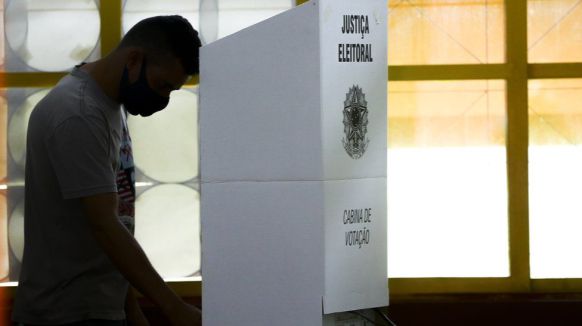RIO DE JANEIRO, BRAZIL – Traditional center-right and right-wing parties emerged as winners Sunday, November 15th, in the first round of municipal elections in Brazil, though conservative President Jair Bolsonaro’s favorite candidates took a beating in the country’s biggest cities. Of 13 Brazilian mayoral candidates explicitly supported by Bolsonaro, 9 were not elected.

In the first elections since the man dubbed the “Tropical Trump” won the presidency in 2018, upending Brazil’s political gameboard, voters continued to punish the divided and weakened left wing, tainted by corruption scandals during 13 years of Workers Party (PT) rule (2003-2016).
But the pandemic-rattled vote was notably not a victory for the far-right president, who currently has no political party and whose candidates mostly lost to competitors from traditional centrist and conservative parties.
“The elections were bad for Bolsonaro,” said Mauricio Santoro, a political science professor at Rio de Janeiro State University. “They show the president is no longer the kingmaker he was in 2018, when his support was enough to get even unknown candidates elected,” he told AFP.
“The general theme of this election is a more cautious voter, tending toward more experienced and moderate politicians than in the anti-establishment election of 2018, which was all about rage and revolt. In 2020, it was more about the pandemic and the economic crisis.”
Bolsonaro remains broadly popular, with approval ratings of more than 40 percent in recent polls, and he still excels at whipping his hardline base into a frenzy with his social media diatribes.
But he faces sharp criticism over his minimalist management of Covid-19, which he has compared to a “little flu” even as it has killed more than 165,000 people in Brazil — the second-highest death toll worldwide, after the United States.
The resulting economic crisis is battering his administration, which could preside over a record recession this year.
The recent election loss in the United States of his political role model, Donald Trump, has only heightened the sense of Bolsonaro’s vulnerability.
Tough mid-term test
In São Paulo, Brazil’s biggest city and business capital, Bolsonaro acolyte Celso Russomanno took a thrashing and failed to reach the November 29 runoff, finishing far behind center-right Mayor Bruno Covas and left-wing candidate Guilherme Boulos, according to official results.
In Rio de Janeiro, Mayor Marcelo Crivella, an evangelical pastor and Bolsonaro ally, reached the second round but trailed ex-mayor Eduardo Paes 37 percent to 22 percent with all ballots counted, election officials said.
It was a good night for Paes’s center-right party Democratas (DEM), which looked on track to win a string of mayoralties in large cities, including Curitiba and Florianópolis in Brazil’s south.
Bolsonaro-backed candidates scored well in a comparatively small number of cities, including Belem (Pará) and Fortaleza (Ceará).
“Bolsonaro will have to cede more to the traditional centrist parties if he wants to advance his agenda in the second half of his term,” said political scientist Oswaldo Amaral of the University of Campinas.
“It’s still early to talk about 2022 (when Bolsonaro faces reelection), but his government will now face more demands to negotiate to get its measures through.”
The Brazilian left, meanwhile, remains weakened and divided after the impeachment of president Dilma Rousseff in 2016 and the jailing of her predecessor, Workers’ Party founder Luiz Inacio Lula da Silva, on corruption charges.
The few bright spots for the left included São Paulo, with PSOL candidate Boulos making it into the runoff, and in Porto Alegre — though it was a disappointing second-place finish there for PCB candidate Manuela d’Ávila, who was the Vice-Presidential candidate of Fernando Haddad (PT), who lost to Jair Bolsonaro. D’Ávila will now face centrist candidate Sebastiao Melo (MDB) in the second round election on November 29th.
Pandemic hits turnout
Postponed by six weeks because of the pandemic, the elections bore the indelible imprint of Covid-19.
The authorities urged Brazil’s 148 million registered voters to bring their own pens, respect social distancing guidelines and disinfect their hands multiple times as they chose the South American giant’s 5,569 mayors and city councils.
Turnout was expected to be low because of Covid-19 fears, especially in large cities, as many voters would choose not to risk their health at the polling stations. Semi-final numbers indicate that only around 100 million registered voters actually turned out to vote.
Voting is mandatory in Brazil for most citizens, but the authorities granted exemptions online this year because of the pandemic, and the fine for not voting costs less than a bus ride. The Superior Electoral Tribunal (TSE) said around 560,000 voters had filed for exemptions from their voting obligation.

